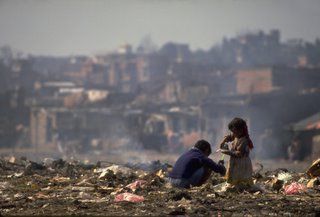
Go to UNICEF's website for the report.
From the Executive Summary:
"Exclusion acts against children in all countries, societies and communities. At the national level, the root causes of exclusion are poverty, weak governance, armed conflict and HIV/AIDS. Statistical analyses of key MDG (Millennium Development Goals) indicators related to child health and education show a widening gap between children growing up in countries with the lowest level of development, torn by strife, underserved by weak governments or ravaged by HIV/AIDS and their peers in the rest of the developing world. These factors not only jeopardize these children's chances of benefiting from the Millennium agenda, they also increase the risk that they will miss out on their childhood and face continued exclusion in adulthood......
"Swift and decisive action (is required) in four key areas:
* Poverty and inequality. Adjusting poverty-reduction strategies and expanding budgets or reallocating resources to social investment would assist millions of children in the poorest countries and communities."At the extremes, children can become invisible, in effect disappearing from view within their families, communities and societies and to governments, donors, civil society, the media, the private sector and even other children. For millions of children, the main cause of their invisibility is violations of their right to protection.......
* Armed conflict and 'fragile' States. The international community must seek to prevent and resolve armed conflict and engage with countries with weak policy/institutional framework to protect children and women and provide essential services. Emergency responses for children caught up in conflict should include services for education, child protection and the prevention of HIV transmission.
* HIV/AIDS and children. Greater attention should be given to the impact of HIV/AIDS on children and adolescents and to ways of protecting them from both infection and exclusion. The Global Campaign on Children and HIV/AIDS will play a significant role in this regard.
* Discrimination. Governments and societies must openly confront discrimination, introduce and enforce legislation prohibiting it and implement initiatives to address exclusion faced by women and girls, ethnic and indigenous groups and the disable.
"Our commitments to children demand that every effort be made to reach them. But how can we reach those children living in the shadows? How can we ensure their inclusion in essential services and their visibility by protecting them from harm, abuse and violence and encouraging their participation in society? Three conclusions emerge:
* Understanding the plight of excluded and invisible children and the factors behind their marginalization, and then focusing initiatives on these children, must form an integral part of national strategies on child rights and development."Governments bear the primary responsibility for reaching out to excluded and invisible children and need to step up their efforts in four key areas:
* The root causes of exclusion and the factors making children invisible must be addressed. Even well funded, well targeted initiatives for disadvantaged families and children risk failure if the overall conditions that foster poverty, armed conflict, weak governance, the uncontained spread of HIV/AIDS and discrimination persist.
* All elements of society must recommit to their responsibilities to children, including the creation of a strong protective environment.
* Research: Strong research is essential to effective programming, but reliable data on these children is currently in short supply."Other actors also have a role to play. Donors and international organizations must create an enabling environment through bold and well conceived policies on aid, trade and debt relief. Civil society must acknowledge its responsibilities to children and be part of the solution. The private sector must adopt ethical corporate practices that ensure that children are never exploited. The media can become a vehicle for empowerment by providing people with accurate information and by challenging attitudes, prejudices and practices that harm children. Finally, children themselves can play an active part in their own protection and that of their peers."
* Legislation: National legislation must match international commitments to children. Legislation that entrenches discrimination must be amended or abolished.
* Financing and capacity-building: Legislation and research on excluded and invisible children must be complemented by child-focused budgets and institution-building.
* Programmes: Service reform to remove entry barriers to essential services for excluded children is urgently required in many countries and communities. Packaging services can increase access, as can the use of satellite and mobile services for children in remote or deprived locations.
No comments:
Post a Comment